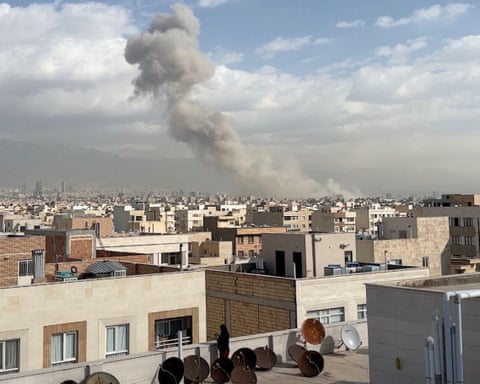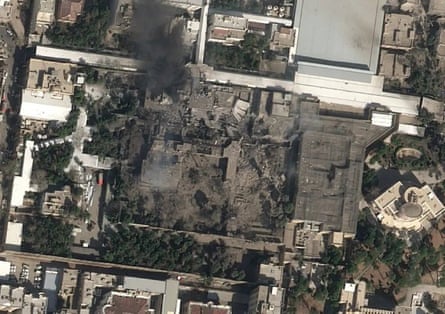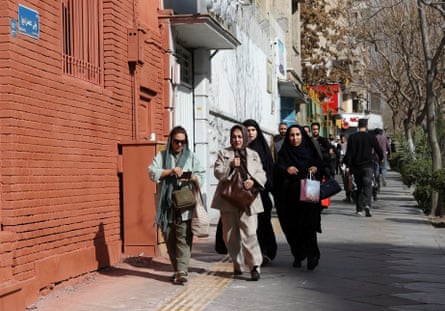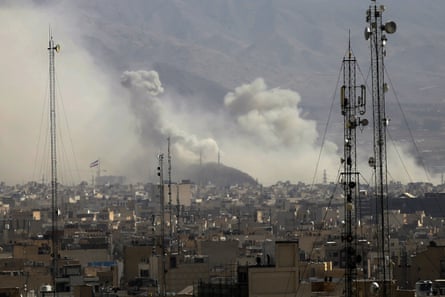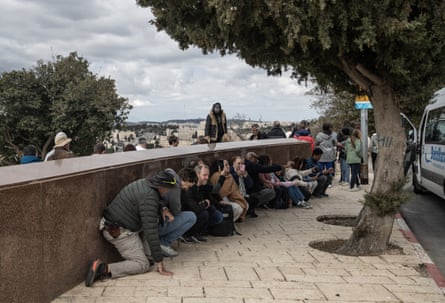An Emboldened Israel Is Seizing Opportunities to Remake Region
"With the war against Iran underway, and the U.S. military as a powerful ally, the Israeli government is seizing its chance to move against other adversaries.

For years, as it railed against Iran’s nuclear program, Israel seemed held in check from confronting Iran militarily. It feared that Hezbollah, Tehran’s political ally and proxy army in Lebanon, would respond on Iran’s behalf, unleashing its arsenal of thousands of missiles and rockets and raining hellfire down on Haifa and Tel Aviv.
Now, Israel and the United States own the skies over Iran and are steadily blowing up its ballistic missile infrastructure and arsenal.
And when Hezbollah joined the fight, however symbolically — with a single, relatively feeble volley of rockets and drones launched into northern Israel at about 1 a.m. Monday — Israel had the pretext it needed. It announced a much more significant and long-in-the-making counteroffensive, striking Hezbollah leaders in Beirut and throughout the country.
Emboldened by its partnership with the United States, feeling its own military strength, and sensing the weaknesses of its two fiercest adversaries, Israel is seizing the new war as an opportunity to pursue its own geopolitical agenda.
“We will end this campaign with not just Iran being struck, but with Hezbollah suffering a devastating blow,” the Israeli military’s chief of staff, Lt. Gen. Eyal Zamir, told division commanders on Israel’s northern border on Monday. He hinted at a long fight with Hezbollah, saying it would not end “before the threat from Lebanon is eliminated.”
This is also a war that Israel started opportunistically. And that fact reflects an important shift in the country’s strategic thinking since the Hamas-led attack on Oct. 7, 2023, and the catastrophic intelligence failures that made it possible.
No longer does Israel trust its intelligence establishment’s ability to read its adversaries’ intentions accurately. So when enemies bent on Israel’s destruction begin amassing the means to achieve it, Israel now sees an imperative to destroy those capabilities whenever it gets the chance.
“That’s why the conversation about whether Iran was really on the verge of developing nuclear weapons doesn’t even really matter at this point,” said Shira Efron, an Israel analyst at RAND, referring to a major rationale for the Israeli-U.S. attack on Saturday.
According to three Israeli defense officials, Prime Minister Benjamin Netanyahu ordered military leaders at the end of last year to begin planning for a solo strike against Iran to be carried out sometime between April and June.
Military commanders were unenthusiastic, one defense official said, because they did not believe that Israel, acting alone, could achieve much more than it had in the 12-day war in June 2025. They were also concerned about their ability to defend against what they expected would be an Iranian response targeting Israeli population centers with ballistic missiles, the defense official said.
Once it became clear that the United States would be Israel’s partner in an attack on Iran and it began to amass forces in the region, two defense officials said, Israeli generals changed their tune. They grasped a historic opportunity to batter Iran, destroy its missile arsenal, further damage its nuclear program, and even try to push the Iranian government to the breaking point.
The shouldering of much of the burden by the Americans — including sending aloft a huge fleet of midair-refueling tankers — made it possible for Israel to deploy its largest air fleet ever on Saturday, the two officials said. That allowed for what proved a devastating assault on Iranian missile launchers, they said.
By contrast, Israel’s campaign against Hezbollah, analysts said, reflects the fact that it had made plans months ago for such an attack and was waiting for an excuse to execute them.
“Israel was waiting for the opportunity,” said Orna Mizrahi, a former deputy national security adviser who specializes in Lebanon at the Institute for National Security Studies in Tel Aviv. She called Monday’s missile and drone strike by Hezbollah a profoundly “stupid adventure.”
Since its eight-week war with Hezbollah in October and November of 2024, Israel has accused the militant group of violating a truce and has struck what it calls terrorist targets in Lebanon almost daily.
“That was the reason to plan for another campaign,” Ms. Mizrahi said. “Every two houses or so, there was military infrastructure and places and equipment and missile launchers. There was a lot to do, and the I.D.F. couldn’t complete all of it.”
Hezbollah, for its part, says those Israeli strikes are violations of the cease-fire, and described its attack on Monday as a response to Israeli provocations. Tens of thousands of people have been displaced in Lebanon since the fighting began, and 52 were killed on Monday, according to the Lebanese government.
For months, Israel threatened to launch a new offensive if Lebanon’s government did not hasten the disarmament of the group, as required under the 2024 cease-fire. Though severely weakened, Hezbollah resisted nationwide disarmament unless Israel stopped its strikes in Lebanon and withdrew from several small areas it has held onto in Lebanese territory.
In January, the Lebanese Army said it had taken operational control south of the Litani River, except for those Israeli outposts.
“But that didn’t mean they had eliminated all the military existence of Hezbollah there,” Ms. Mizrahi said. “They didn’t even pretend to. And this is not enough for Israel.”
As for what a new Lebanon campaign will entail, analysts said they expected a ground operation, not just airstrikes, and noted the deployment of reservists to infantry and armored units along the northern border. An Israeli military spokesman announced Tuesday morning that troops had indeed seized new areas of southern Lebanon close to the border overnight, but insisted that this was a “tactical step” and not part of a broader maneuver or invasion.
Shimon Shapira, a retired brigadier general who has studied Hezbollah for many years, said the objective of the new offensive against the group had to be nothing short of dismantling its military.
“The goal is to make Hezbollah a political party without any weapons or army,” he said. “You can take the missiles, the weapons, the ammunition. That you can do. And on the way, kill the commanders.”
On Monday, Mr. Netanyahu, visiting the scene of a deadly Iranian missile strike, assured Israelis and Iranians that the “day is nearing” when the Iranian people would be able to break free from “the yoke of tyranny.” And when that day comes, he said, “Israel and the United States will be there.”
If Israel’s leaders sound upbeat about the prospects for this two-front war and what it could mean for the region, that should not come as a complete surprise, analysts said.
Apart from the war in Gaza, Israel has had a powerful run militarily in the past few years, weakening Iran’s proxies in Syria and Lebanon, and overshadowing its Oct. 7 failures with repeated intelligence coups and devastating aerial attacks.
But the country’s swaggering self-confidence also carries the possibility of overreach.
Ms. Efron, the RAND analyst, said that Israel needed to remember to make political agreements, not just make war.
“For a country of 10 million people to think that, just through the use of force, it can transform the whole region, is a bit of a stretch,” she said. “No one likes Iran, but that doesn’t mean that bullyish behavior by Israel is acceptable.”
David M. Halbfinger is The Times’s Jerusalem bureau chief, leading coverage of Israel, Gaza and the West Bank. He also held that post from 2017 to 2021. He was the politics editor from 2021 to 2025.
Ronen Bergman is a staff writer for The New York Times Magazine, based in Tel Aviv."




